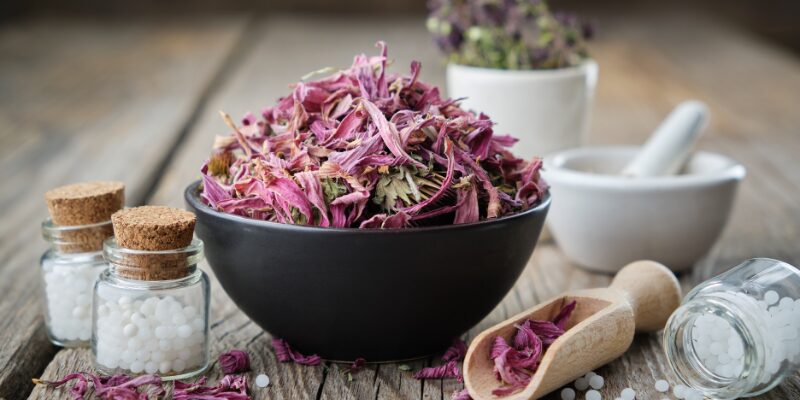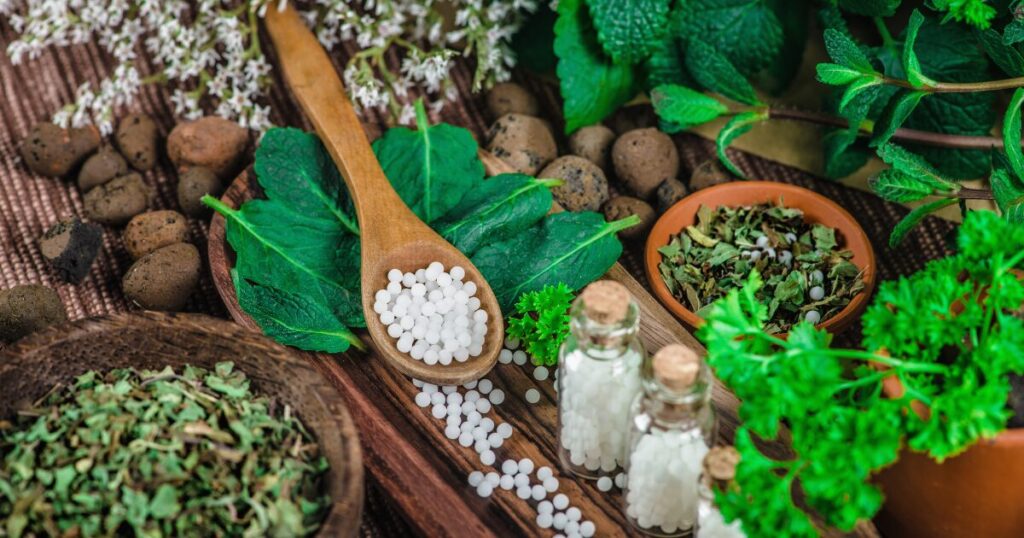
How to Soothe Your with Homeopathic Remedies for Anxiety
- January 22, 2024
- Nutritional Psychology
- 0 Comments
Life’s moving fast, and anxiety’s become a familiar companion. Juggling work, relationships, and the crazy speed of everything can leave us feeling overwhelmed. The usual ways to handle anxiety might not always cut it for those wanting a more natural fix.
The constant worry drags you down, making even the most minor tasks feel like a struggle. Anxiety’s like a cloud over everything, messing with your sleep and flooding your mind with thoughts that just won’t quit. Sure, the usual fixes might help a bit, but who wouldn’t want something gentler and more lasting?
In this blog, you will explore how these natural homeopathic remedies can help ease anxiety and find calm.
Table of Contents
Understand about Homeopathic Remedies for Anxiety
Homeopathic remedies are part of a medical system based on the idea that the body can heal itself. Developed in the late 1700s in Germany, homeopathy utilizes tiny amounts of natural substances, such as plants or minerals, to stimulate the body’s healing processes.
The guiding principle is “like cures like,” meaning a substance that causes specific symptoms in large doses can treat those same symptoms in small doses.
This concept dates back to ancient Greece and Egypt.
Homeopathic remedies are made from various sources like herbs, plants, minerals, and even snake venom, which undergo a process of sequential dilution and succussion (vigorous shaking) called potentisation.
Although famous in many European countries, homeopathy is less widely embraced in the United States.
Homeopathy treats a wide variety of health issues, including
- Allergies
- Migraines
- Anxiety
- Depression
- Chronic fatigue syndrome
- Rheumatoid arthritis
- Irritable bowel syndrome
- Premenstrual syndrome
Read more: Exploring the Wellness Benefits of Mindful Eating.
How Homeopathy Can Help With Anxiety

If you’re dealing with anxiety and considering homeopathic options, here are some treatments to explore. Remember that these suggestions come from the homeopathy industry rather than mainstream medical professionals.
Argentum Nitricum:
Sometimes advised for anxiety related to uncertainty, such as claustrophobia or fear of everyday things. Digestive issues like diarrhea and cravings for sweets may accompany anxiety.
Arsenicum Album:
Purportedly for anxiety stemming from fear of loneliness, darkness, or imperfection. Individuals with this anxiety type may fear being alone, may seek control, and often feel cold.
Aconite:
Recommended for sudden, intense anxiety or panic linked to past trauma. Symptoms may include dry skin, dry mouth, and a rapid heartbeat.
Gelsemium:
Suitable for those facing anxiety due to feelings of inadequacy. Timid and shaky individuals who may avoid crowds for public speaking and desire solitude.
Calcarea Carbonica:
Like Arsenicum, it is recommended for those fearing a departure from routine. Anxiety worsens with changes in plans, and they struggle with adaptability.
Ignatia:
Recommended for anxiety resulting from grief or loss. Sensitive individuals are prone to mood swings, ranging from laughter to tears.
Kali Phosphoricum:
For individuals vulnerable to stress or feeling overwhelmed. Anxiety manifests physically due to excessive workload or daunting ambitions.
Kali Arsenicosum:
Targeted at health-based anxiety, including hypochondria and fear of heart attacks. Racing thoughts, difficulty sleeping, and a fear of death or dying may be present.
Pulsatilla:
It is suited for those with childlike anxiety needing reassurance and support from others.
Lycopodium:
Similar to Gelsemium, it is suggested for those lacking self-confidence. Fearful of public speaking but may hide it by talking loudly or frequently.
Stramonium:
Addresses anxiety with night terrors, nightmares, or dark thoughts. Individuals may fear the dark of being alone and have vivid imaginations, worsening their anxiety.
Phosphorus:
They are thought to be beneficial for socially anxious individuals. Scattered thoughts and difficulty focusing are tied to a need for approval in social or romantic circles.
Silica:
Similar to Gelsemium and Lycopodium, for those fearing new experiences and attention. They tend to become workaholics to cope with their fears.
Read more: Understanding the 7 Stages of Grieving
Are There Any Side Effects to Using Homeopathy?

When made correctly, homeopathic remedies are generally considered safe for you, with minimal risk of side effects.
Homeopathic anxiety remedies are designed to contain shallow levels of the substances they are labeled for, and in many cases, the molecules of these substances are not expected to be present.
It’s important to note that even when potentially toxic ingredients are included in homeopathic remedies, the dilution is typically significant enough to be considered safe for you.
However, it’s crucial to be aware that the U.S. Food and Drug Administration (FDA) does not regulate homeopathic supplements, so there can be variations in quality and safety among different products.
To ensure your safety, purchasing homeopathic remedies from reputable companies with good reputations is advisable.
Many homeopathic supplements do contain toxic substances, and if not properly made and diluted, they can pose risks for you.
For instance, substances like arsenic and aconite, which are sometimes used in homeopathy, can be fatal if consumed in higher concentrations.
To mitigate risks for you, sourcing products from trustworthy manufacturers and consulting with a certified homeopathy practitioner is recommended.
If you experience any unusual side effects, you must discontinue use immediately and seek advice from a medical professional. Being cautious about the quality and source of homeopathic remedies can contribute to a safer and more effective use of these products.
Read more: Overcoming Plateaus When Feeling Stuck in Therapy.
Other Natural Treatments for Anxiety

Beyond homeopathic remedies, there are several other natural treatments for anxiety or panic attacks that you can explore. Some of these alternatives have more extensive research supporting their effectiveness compared to homeopathy:
- Vitamins:
- Vitamins A, C, D, E, and B vitamin complexes are believed to relieve anxiety holistically over the long term.
- Minerals:
- Minerals, particularly magnesium, may offer relief, as suggested by a 2015 study.
- Supplements:
- Omega-3 fatty acids, certain amino acids, and specific neurotransmitters like 5-HTP are reported to have potential benefits for anxiety.
- Herbs:
- Various herbs, such as lemon balm, bacopa, and passionflower, have been researched for their potential in managing anxiety.
- Meditation and Relaxation:
- Learning mindfulness-based stress management strategies through meditation and relaxation techniques can be effective in dealing with anxiety. There is significant research supporting the use of these approaches.
It’s essential to note that while these natural treatments may have some scientific support, individual responses can vary.
If you have pre-existing medical conditions or other medications, you should have a healthcare professional before beginning any new treatment regimen. Incorporating these natural approaches into a comprehensive anxiety management plan may provide additional support for overall well-being.
Read more: The Ultimate Guide to Choosing the Best Beauty Supplements and Vitamins for Your Skin.
Final Thought
Homeopathy is a relatively safe option for naturally reducing anxiety, and it can help relieve panic attacks quickly. The associated side effects are minimal, making it a potential solution for mild anxiety.
Despite being used for a long time to treat anxiety in some individuals, mainstream doctors do not recommend homeopathic remedies due to mixed research findings. The efficacy of these remedies, if experienced, could be attributed to the placebo effect. While relying on the placebo effect might be considered, it is essential to acknowledge its potential role in the observed benefits.
If you find that homeopathy does not improve your anxiety or if you experience any side effects, it is recommended to discontinue its use. In such instances, consulting with your doctor promptly is crucial to explore alternative and more evidence-based interventions for managing anxiety.






